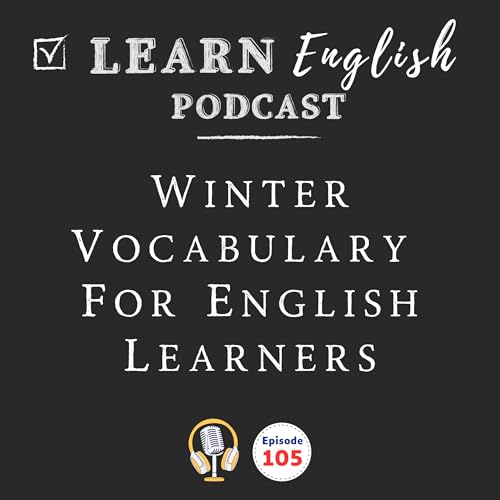❄️ Winter has arrived, and this episode teaches the most useful winter vocabulary English speakers use in everyday conversations, weather forecasts, and cold-weather news updates. This lesson is designed for B1–B2 English learners who want real-life listening practice, stronger seasonal vocabulary, and more confidence talking about winter in English.
You’ll learn clear explanations of important winter terms such as freezing, frosty, wind chill, sub-zero temperatures, freezing rain, sleet, hail, black ice, flurries, snow accumulation, snowstorms, blizzards, whiteouts, and cold snaps. These expressions appear throughout the United States during the winter months, and this episode helps you understand and use them naturally.
By the end of the episode, you’ll feel more confident describing winter weather, understanding conversations about cold temperatures, and using these vocabulary words in your own speaking and writing. Review the vocabulary list in the episode description, follow along with the lesson, and keep improving your English through real-life topics.
🔔 Follow us on social media @LearnEnglishPod and visit our website:
Podcast website: https://learnenglishpod.com/
Follow us on social Media: https://linktr.ee/learnenglishpod
Take lessons with me: https://www.italki.com/en/teacher/8531387
📚Affiliate link for italki: https://www.italki.com/en/i/ref/GBBdbb
Affiliate link for Lingq: https://www.lingq.com/?referral=msusc
🔗Previous Vocabulary Episodes:
Episode 20 Rain Vocab: https://youtu.be/PbuzHAZOAT4
Episode 81 Summer Vocab: https://youtu.be/o7NM4w8WDiE
📝 Vocabulary list:
1) Freezing – Extremely cold, at or below the temperature where water turns to ice (0°C / 32°F).
2) Frost – A thin layer of ice that forms on surfaces when temperatures are low.
3) Sub-zero temperatures – Temperatures below zero degrees on the Fahrenheit scale, extremely cold.
4) Freezing rain – Rain that falls as liquid but freezes upon touching cold surfaces.
5) Black ice – Invisible ice on roads that is very dangerous for driving.
6) Flurry – A short and light period of snowfall that does not accumulate much on the ground.
7) Accumulation – A build-up of snow or ice on the ground.
8) Blizzard – A severe snowstorm with heavy snow, strong winds, and poor visibility.
9) Whiteout – A condition where snow or weather reduces visibility so much that you can’t see anything.
10) Pellets – Small, rounded pieces of ice or snow.
11) Dangerous conditions – Weather that could cause harm, like icy roads or heavy snow.
12) Snowflake – A single ice crystal that falls from the sky, often with a unique shape.
 24 min
24 min 18 min
18 min 18 min
18 min 19 min
19 min 15 min
15 min 20 min
20 min 17 min
17 min 21 min
21 min
